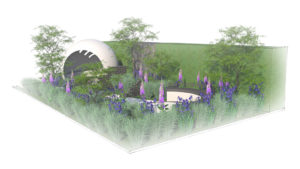 Scientists backed by NIHR Biomedical Research Centres (BRC) have teamed up with designers and young people living with HIV to create a show garden at this year’s RHS Chelsea Flower Show.
Scientists backed by NIHR Biomedical Research Centres (BRC) have teamed up with designers and young people living with HIV to create a show garden at this year’s RHS Chelsea Flower Show.
The garden, whose theme is ‘HIV: stigma and cure’, highlights the successes and challenges still faced by young people living with HIV.
The garden was conceived by Professor John Frater from the University of Oxford and Professor Sarah Fidler from Imperial College London. Jointly they lead the NIHR BRC CHERUB collaboration (Collaborative HIV Eradication of Reservoirs UK BRC) – a UK network of internationally recognised doctors and researchers from the NIHR Biomedical Research Centres at Oxford, Cambridge and London working together with patients to find a cure for HIV infection.
There are 37 million people living with HIV around the world, and around two million people are infected every year, or one person every 15 seconds. A child is infected every three and a half minutes.
Prof Frater, who is supported by the NIHR Oxford BRC, said: “HIV remains a major global problem even though it is much less in the news. Despite the dramatic success of HIV treatment, which has changed HIV from being a death sentence into a manageable but lifelong condition, there’s still an enormous amount of HIV-associated stigma.
“Coming to terms with HIV-related stigma is a key part of helping all people living with HIV to live a healthy life and to take their daily medication, which is something we wanted to highlight in through this garden.”
Prof Fidler said: “The first important step towards finding a cure for HIV requires years of daily HIV medication which leads to very low levels of virus in the body. Once this has been achieved, we are searching for new ways to try and cure HIV. The NIHR-supported CHERUB collaboration is working together to look for new treatments and tests that might allow people to stop their medicines and remain free from the virus.”
The show garden, the first that designer Naomi Ferrett Cohen has created since she graduated from the London College of Garden Design, charts the journey of a young person living with HIV, exploring the stigma and marginalisation they may encounter along their journey from the safety and protection of attending an NHS clinic, towards a normal life of acceptance and freedom.
Young people from CHIVA, the Children’s HIV Association, were involved in the design of the garden, sharing their thoughts and experiences of growing up with HIV.
The unveiling of the garden comes shortly before the announcement of the results of the ‘RIVER’ trial, which has taken place in the UK and is the first formal randomised trial exploring a possible cure for HIV infection.
Prof Frater is co-Principle Investigator and Scientific Lead for the CHERUB project.